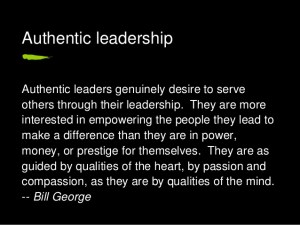One of the most basic truths of Authentic Leadership is that you can care for people without leading them but you cannot lead them without caring for them.
Attempting to lead people without caring for them causes the “leader” to actually manage people instead of leading them. Those leaders would tell you that they in fact do care about their people but their choice of words betrays them.
We manage things. We lead people. We care about things, we care for people. The difference is not merely word games. The real difference is in mindset. The mindset of caring for others is the biggest difference between Authentic Leaders and those who merely have a title indicative of a leader.
When you consistently demonstrate that you care for people the level of commitment you’re able to gain from the people you lead goes up. Way way up. People are not following you because of your title. They are following you because of what they have seen you do for others and what they have felt you do for them.
When people feel better about themselves because of you then you are an Authentic Leader.
I once had a person in a top level leadership position ask me how to fake authenticity. This was during a leadership workshop with his entire leadership team in the room. He said if I knew his people the way he knew his people I wouldn’t care for them either. Again, he said this out loud, with his entire leadership team in the room. I have done literally hundreds and hundreds of leadership meetings like that and I had never seen anything like that before. I’ve never seen anything like that since either.
He was without a doubt the worst person I’ve ever seen hold a high leadership position.
But he at least said what he thought out loud. I fear there are more people who think like him and indeed try to fake authenticity. They pretend to care. They think they are fooling people. They believe they are smarter than everyone else and that they will never be found out.
But no one hides who they really are for very long. No one. People figure it out. If you’re in a leadership position then you must know that the people you’re supposed to be leading are almost always watching you. They are always evaluating whether or not your words match your actions. They want to know if you’re walking your talk.
As I said earlier in this post, you cannot lead people without truly caring for them. That’s a fact. It’s also a fact that you can’t “fake care” for very long. When you suffer from a failure to care then the people you’re supposed to be leading also suffer. They suffer from a lack of true leadership.
If you don’t genuinely care for people then I would submit that you are not qualified to lead, not even yourself.

 I am frequently asked how to define the difference between Leadership and Authentic Leadership.
I am frequently asked how to define the difference between Leadership and Authentic Leadership.



